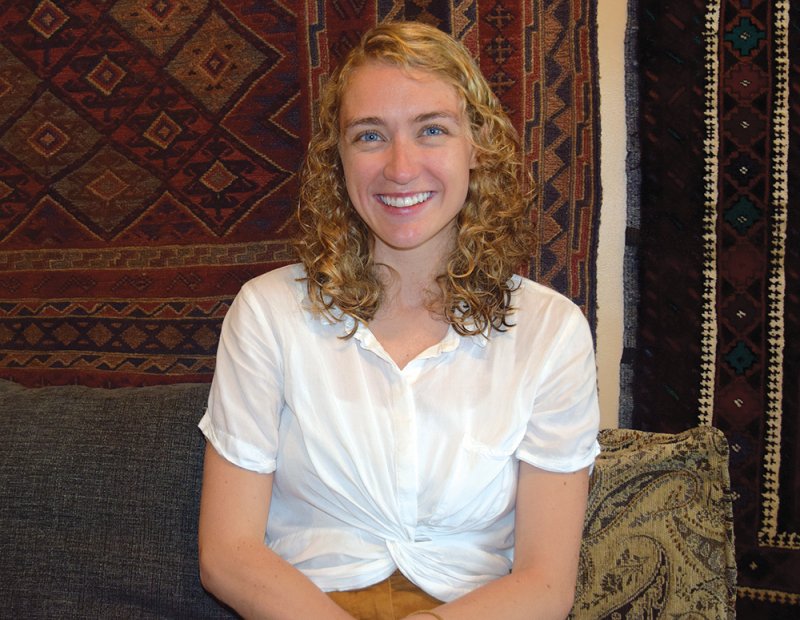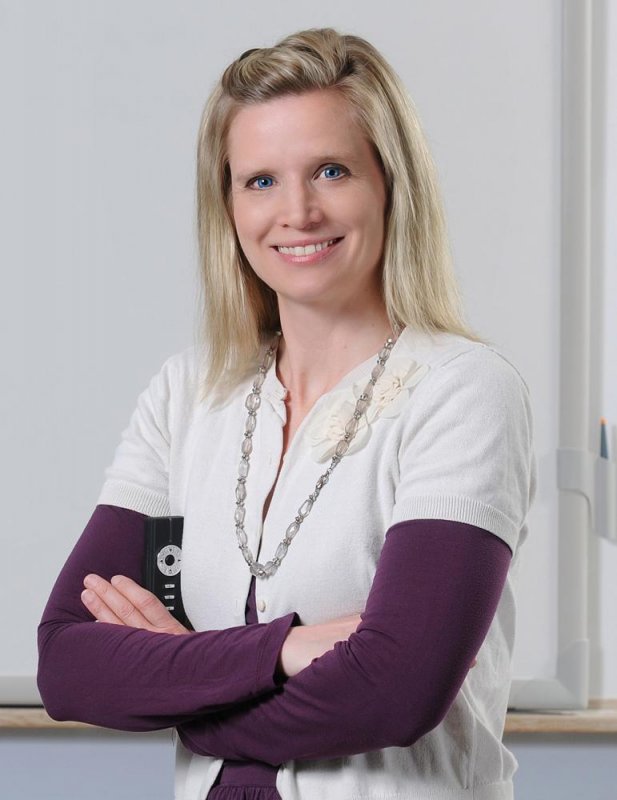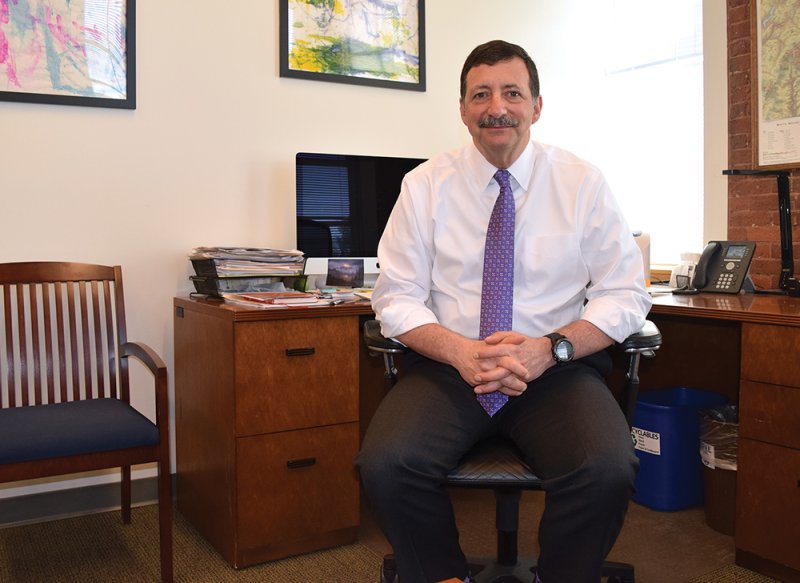 This story was produced for The Granite State News Collaborative as part of its Granite Solutions reporting project. For more information visit collaborativenh.org.
This story was produced for The Granite State News Collaborative as part of its Granite Solutions reporting project. For more information visit collaborativenh.org.
Eleanor McKenzie is on a mission to help teens make healthier choices when it comes to sex and relationships. She does this for Amoskeag Health as a social worker. The seeds for her work were planted while majoring in women’s studies and social work at the University of NH.
 After graduating and working as a medical assistant for a few years, McKenzie (pictured) decided to go back to school. She was debating between nursing and social work when she reconnected with a mentor, who helped her secure a grant to pursue her master’s in social work. That led to an internship at Amoskeag Health in Manchester, working for PREP, or Personal Responsibility Education Program, a comprehensive sexual health program provided to teens in Sullivan County and Manchester.
After graduating and working as a medical assistant for a few years, McKenzie (pictured) decided to go back to school. She was debating between nursing and social work when she reconnected with a mentor, who helped her secure a grant to pursue her master’s in social work. That led to an internship at Amoskeag Health in Manchester, working for PREP, or Personal Responsibility Education Program, a comprehensive sexual health program provided to teens in Sullivan County and Manchester.
“I was able to educate teens about themselves and the world around them,” says McKenzie of the work that she now does full-time, having earned her master’s.
This is exactly the type of story NH’s mental health leaders wish they heard more often. Nationally and in NH, there is an acute shortage of behavioral health workers, from psychiatrists to substance use disorder counselors. Gov. Chris Sununu said in January that “approximately 10% of clinical positions in New Hampshire’s public mental health system were unfilled in April of 2018,” and that data from the U.S. Bureau of Labor Statistics shows the distribution of clinical psychologists, social workers and mental health counselors is “uniquely sparse in New Hampshire compared to neighboring states.”
Among the barriers to finding these professionals is the high cost of education and becoming credentialed. Combine that with the industry’s lower pay and a high burn-out rate and you get the gist of the problem.
A Healthy Pipeline
It’s a shortage that persists despite what appears to be a strong pipeline of students interested in the field of psychology. Of the 1.9 million undergraduate degrees conferred nationwide in the 2016-2017 academic year, psychology was the fourth largest degree (116,861) after business, health programs and social sciences and history, per the National Center for Education Statistics.
The American Psychological Association (APA) reports the number of high school students taking the advanced placement psychology test increased from 3,916 in 1992, to 303,000 in 2017.
The share of college students majoring in psychology has hovered around 6 to 6.5 percent since the early 1990s, up from about 4 to 5 percent in the 1980s, which makes psychology the number one major within science and engineering, reports the APA.
Psychology is the most popular major at UNH, with more than 700 students enrolled, according to Joan Glutting, clinical professor in the psychology department. “We are the largest producer of frontline behavioral health staff,” she says.
The state university is not alone. There are 14 NH schools offering psychology degrees: two offer an associate’s degree, 12 offer bachelor’s degrees and eight offer master’s degrees. The Department of psychological and brain sciences at Dartmouth College had more than 100 psychology and neuroscience majors in the class of 2019 alone.

Dartmouth College graduate student Nicole DeAngeli works in the lab of David Bucci, the Lincoln Filene Professor of Human Relations and professor of psychological and brain sciences. Photo courtesy of Dartmouth College and Robert Gill.
At St. Anselm College in Manchester, there are 130 students enrolled in psychology and behavioral neuroscience majors, recently graduating 33 with psychology degrees, says Elizabeth P. Ossoff, professor and chair of psychology and behavioral neuroscience at Saint Anselm College.
Marc Wilson, executive director of counseling programs at Southern NH University in Manchester, says the school has 8,000 undergrad psychology students and 5,000 psychology students taking courses online. “Psychology is our largest program,” he says.
Interestingly, the average age of students in the online psychology programs is 35 to 45, Wilson says, adding that 40 to 45% of those students do not have a relevant undergrad degree.
With such a robust pipeline, many are asking why the labor shortage persists. Leaders offer four reasons: more people than ever are seeking mental health treatment; the opioid crisis overwhelmed the capacity of many addiction treatment programs; the field of behavioral health is broad, encompassing psychiatrists, psychologists, marriage therapists, social workers, substance abuse counselors and more; and demand for professionals has increased in nontraditional settings, such as schools, nursing homes and prisons.
Burn-out is also a hindrance. When someone is frustrated or overwhelmed, the promise of a less stressful job with a higher paycheck can be very appealing. And there’s a built-in market for skilled workers with a behavioral health background.
“Businesses are getting savvy that emotional health is the number one thing that will turn their bottom line around,” says Rik Cornell, vice president of community relations at The Mental Health Center of Greater Manchester. He says companies are hiring people with a psychology background to develop and run wellness and training programs for employees.
The pipeline of talent gets even narrower at the PhD level. Dartmouth College offers doctorates in psychology while Antioch University New England in Keene offers a doctorate in marriage and family therapy. Like those pursuing master’s degrees, doctoral candidates must complete internships, which links them to professional opportunities in NH.
Internships at all levels are key to helping students continue their career in NH. “It’s important for bringing psychologists to the state and hopefully keeping them here,” Glutting says. “Where you intern is often where you go into practice.”
But competition for PhD slots is fierce. Nationally, PhD programs in clinical psychology accept only 2 to 4% of applicants, Glutting says. Antioch accepts only 25 to 35 students per year to their five-year PhD program, says Kevin Linus, department chair, noting a master’s degree is earned during the PhD process.
Earning those advanced degrees is not cheap. Once a graduate lands a job, the salary may not be enough to pay off student debt. “Pay is the elephant in the room,” says Metoka Welch, associate dean of counseling programs at Southern NH University. “Until you are licensed, you will not see a return on investment. The pay is sometimes not where you want to see it initially.”
So while there is a healthy pipeline of students flowing into the field at the beginning of a student’s career, it shrinks as students are required to pursue more advanced and expensive degrees that are competitive.
Licensing Challenges
For licensed alcohol and drug abuse counselors (LADACs), there are additional barriers to starting work in NH, says Elizabeth Harwood, coordinator of the psychology department at Rivier University in Nashua.
 Graduates must acquire extensive hours in the field before getting licensed and a licensed practitioner must supervise that work. With such a pronounced shortage of professionals, it can be difficult to find a supervisor. “There are not a lot of behavioral health workers and those who are here are pressed for time,” Harwood (pictured) says. LADACs sometimes have to pay for supervisor oversight, which adds to their debt.
Graduates must acquire extensive hours in the field before getting licensed and a licensed practitioner must supervise that work. With such a pronounced shortage of professionals, it can be difficult to find a supervisor. “There are not a lot of behavioral health workers and those who are here are pressed for time,” Harwood (pictured) says. LADACs sometimes have to pay for supervisor oversight, which adds to their debt.
Loan Assistance
Reducing student debt for those entering the behavioral health field is one way state and federal officials are attempting to address the workforce shortage. At the federal level, there are legislative efforts to provide or expand loan repayment programs to mental health workers. A federal bill introduced in 2018 proposes establishing a loan repayment program for mental health care providers who commit to working in communities designated as having a higher need.
Under the Mental Health Professionals Workforce Shortage Loan Repayment Act of 2018, individuals would be eligible to have up to $250,000 of their student loans repaid by the federal government. The bill was referred to the U.S. Committee on Health, Education, Labor and Pensions in December.
Loan repayment programs are also on the table. Sununu signed an executive order in January to establish NH’s Statewide Oversight Commission on Mental Health Workforce Development to coordinate mental health workforce initiatives, including evaluating potential student loan repayment programs, recommending professional development programs for mental health workers and evaluating the feasibility of establishing a centralized training and technical assistance center to aid in training mental health workers in the state. The commission is required to submit a report by the end of November summarizing its progress.
Rivier University, which established The Center for Behavioral Health Professions and Workforce Development three years ago through a federal grant, is able to offer $5,000 to students pursuing a master’s degree in psychiatric nursing and who have completed 1,500 hours of training to offset educational costs, says Sister Paula Marie Buley, president of Rivier. She says psychiatric nurse practitioners can diagnose and treat mental health issues, which can fill the gap left by too few psychologists and psychiatrists in New Hampshire.
Rivier also partnered with the Manchester Community Mental Health Center to offer internships and loan repayments up to $10,000 if students are then hired for a full-time position. “If someone knows they will have $5,000 or $10,000 dropped off their loan, it’s enticing,” Cornell says.
UNH also received a federal grant to offer $10,000 stipends to master’s students pursuing social work and occupational therapy who complete their fieldwork in NH’s underserved areas. “Our goal is to train 116 social workers or occupational therapists,” through the program, says Mike Ferrara, dean of UNH’s College of Health and Human Services.

Mike Ferrara, dean of UNH’s College of Health and Human Services. Photo by Matthew J. Mowry.
The most extensive plan is the NH State Loan Repayment Program, established more than 25 years ago, to address a shortage of providers, says Alisa Druzba, administrator of the rural health and primary care section of the NH Department of Health and Human Services.
When Druzba took over 15 years ago, the program gave out $150,000 annually. Over the years, the amount has fluctuated from $250,000 to $400,000 annually, she says, adding, in 2015, NH became the first state to provide loan repayments to substance use disorder counselors.
Legislators, recognizing the state’s mental health needs, increased funding from $250,000 to $960,000 in its last session. Additional funds allowed the program to triple the number of health providers receiving loan repayments.
Antioch operates a family and couples institute for the community as well as mental health clinics within Keene that allow students, under supervision, to apply their lessons in a therapeutic setting, Linus says. The clinic at Antioch provides services on a sliding fee scale and helps 200 patients annually, says Vince Pignatiello, director of the Psychological
Services Center an co-chair of the department of clinical psychology.
Internships not only provide valuable learning for students, but help meet the needs of the community. “These agencies are getting hundreds of hours of client contact every year for very low cost,” Linus says.
The state’s 10-year mental health plan notes the workforce initiatives that are already underway and the plan also calls for developing an oversight body “to foster collaboration and learning across existing initiatives and to develop a comprehensive statewide workforce action plan.”
The schools interviewed for this story acknowledge new programs they have instituted across different specialties to make behavioral health programs better serve students and ultimately alleviate workforce challenges in NH.
Building on Programs
Colleges and universities also are increasing their course and degree offerings in behavioral health. In January, UNH added a nurse practitioner psychiatric health certificate as a post-master’s offering. “We did that directly to increase the workforce in mental health,” Ferrara says. “We’re adding more faculty to meet demand.” UNH received 80 applications for 20 open spots, he says.
This past spring, Rivier started offering a substance use disorder track within the undergraduate psychology major. The track consists of seven courses that, with clinical hours, lead to becoming a licensed drug and alcohol counselor, Harwood says.
UNH also offers three ways for students to earn a master’s degree in social work: traditional classroom courses in Durham, a hybrid model of classroom and online instruction offered through UNH Manchester or a complete online degree. “That has exceeded our expectations in enrollment,” Ferrara says, adding each cohort has 12 to 25 students to ensure quality of instruction.
As demand for behavioral health professionals continues to grow, colleges and universities continue to assess their offerings to ensure students are up to the task. “There is an expectation for our students that once they graduate, they are job ready,” Buley says.

 Current Issue - April 2024
Current Issue - April 2024